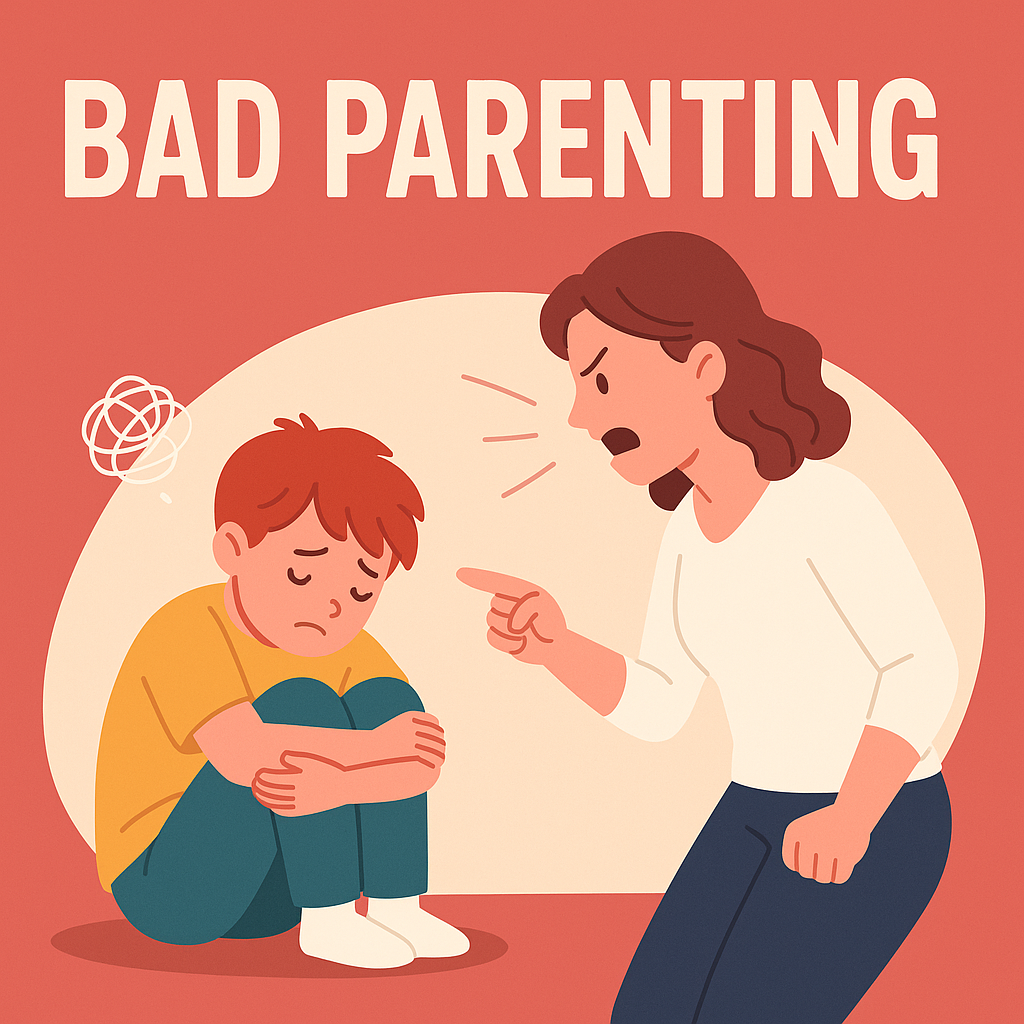Parenting is one of the most beautiful and demanding jobs in the world. But let’s be honest—it’s also one of the easiest to mess up, even with the best intentions. The term “bad parenting” gets thrown around a lot, sometimes unfairly. It can sting deeply, especially when we’re all just trying our best.
So, what exactly is bad parenting? Is it making a mistake once in a while, yelling when you’re overwhelmed, or letting your kid watch too much screen time on a rough day? Not necessarily.
Let’s break down what bad parenting truly means, what it looks like, and—most importantly—how to recognize harmful patterns before they become habits.
Bad parenting isn’t about occasional mistakes or learning curves. It’s about consistent negative patterns that harm a child’s emotional, mental, or physical development. This doesn’t mean you need to be perfect (no one is), but it does mean that when harmful behaviors are repeated without reflection or change, they can have lasting consequences.
Bad parenting can stem from many sources—stress, trauma, lack of awareness, or simply not knowing any better. That’s why understanding and reflection are so important.

Signs of Bad Parenting
Every parent loses their cool or makes questionable choices from time to time. But if any of the following behaviors happen regularly, they may be signs of a deeper issue that needs to be addressed. Below are the bad parenting signs that can help parents to reduce the impacts of bad parenting and move towards positive discipline strategies.
1. Constant Criticism or Shaming
If a child constantly hears, “You’re so lazy,” or “Why can’t you be more like your brother?” they internalize those labels. Criticism that targets a child’s character (rather than their behavior) can destroy self-esteem and create long-term insecurity.
Better Approach: Address the behavior, not the child. Instead of saying, “You’re always messy,” try, “Let’s figure out how we can keep your room more organized.”
2. Neglect (Emotional or Physical)
Neglect isn’t just about failing to provide food or shelter. Emotional neglect—ignoring a child’s feelings, not listening to them, or being emotionally unavailable—can be just as damaging.
Children need to feel seen and heard. They thrive on connection, consistency, and comfort.
3. Overly Harsh Discipline
Discipline should teach, not punish. Spanking, yelling, or using threats (e.g., “I’ll leave you here if you don’t behave”) may stop a behavior temporarily, but they don’t teach kids why their actions were wrong. Instead, they often create fear, resentment, or rebellion.
Better Approach: Use consequences that are logical and age-appropriate, and always explain the “why.”
4. Inconsistency or Favoritism
Children need predictability. If rules change depending on your mood—or if one sibling is clearly favored over the other—it can breed confusion, rivalry, and insecurity.
Better Approach: Keep boundaries consistent and treat each child as a unique individual with equal worth.
5. Lack of Affection or Praise
Love needs to be felt, not just assumed. Children crave physical and verbal affection—hugs, kind words, smiles, and encouragement. A lack of warmth can lead children to seek validation elsewhere, often in unsafe ways.
The Consequences of Bad Parenting
Repeated bad parenting behaviors can lead to:
- Low self-esteem
- Trust issues
- Aggression or anxiety
- Academic struggles
- Difficulties forming healthy relationships
- Mental health challenges in adolescence or adulthood
But here’s the good news: children are incredibly resilient. With awareness and intentional change, even families who’ve struggled can rebuild stronger relationships and healthier dynamics.

What Bad Parenting Is Not
Let’s take a moment to ease some guilt. Bad parenting is not:
- Letting your kid eat mac & cheese three nights in a row
- Losing your patience after a long day
- Forgetting spirit week at school
- Allowing screen time so you can work or breathe
- Feeling like you’re failing, even when you’re doing your best
These things don’t make you a bad parent. They make you human.
What matters is how you reflect, repair, and grow.
How to Turn Things Around
If you recognize some of these patterns in yourself (and many of us will), it’s not too late to make changes. Here’s how to start:
1. Apologize When Necessary
It might feel awkward, but apologizing to your child after you’ve yelled or acted unfairly teaches them humility and accountability. It models emotional intelligence.
“I was wrong to yell. I’m sorry. Let’s talk about what we both felt.”
2. Ask for Help
Parenting isn’t meant to be done alone. Whether it’s therapy, parenting groups, books, or talking to friends—reach out. You don’t have to figure it out all on your own.
3. Be Willing to Change
Parenting is as much about growth for you as it is for your child. What you learned as “normal” growing up might not be healthy now. Be open to new ways of connecting and disciplining that honor your child’s needs.
4. Create a Safe, Loving Environment
Make your home a place where your child feels safe—emotionally and physically. This doesn’t mean there are no rules; it means those rules exist in a space filled with love and respect.
Final Thoughts
Bad parenting isn’t just about making mistakes—it’s about ignoring them. If you’re reading this, chances are you care deeply about doing better, and that alone puts you far from being a bad parent.
Parenting is a journey. You’ll fall short and you’ll raise your voice. You’ll feel like you’re failing. But you also have endless opportunities to reconnect, to reflect, and to grow with your child.
So give yourself grace—but also give yourself accountability. Our kids don’t need perfect parents. They need present, honest, and loving ones.
